 Petzlover
Petzlover Berger Blanc Suisse is originated from Switzerland but Newfoundland Dog is originated from Canada. Berger Blanc Suisse may grow 8 cm / 3 inches shorter than Newfoundland Dog. Berger Blanc Suisse may weigh 40 kg / 88 pounds lesser than Newfoundland Dog. Both Berger Blanc Suisse and Newfoundland Dog has almost same life span. Berger Blanc Suisse may have less litter size than Newfoundland Dog. Both Berger Blanc Suisse and Newfoundland Dog requires Moderate Maintenance.
Berger Blanc Suisse is originated from Switzerland but Newfoundland Dog is originated from Canada. Berger Blanc Suisse may grow 8 cm / 3 inches shorter than Newfoundland Dog. Berger Blanc Suisse may weigh 40 kg / 88 pounds lesser than Newfoundland Dog. Both Berger Blanc Suisse and Newfoundland Dog has almost same life span. Berger Blanc Suisse may have less litter size than Newfoundland Dog. Both Berger Blanc Suisse and Newfoundland Dog requires Moderate Maintenance.
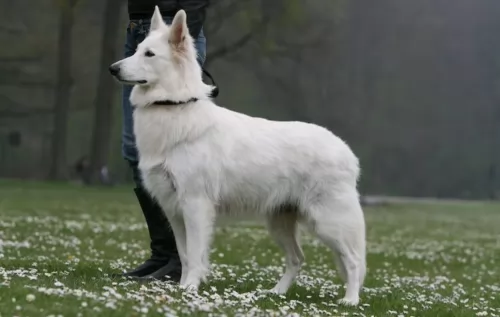 The Berger Blanc Suisse is also referred to as the White Swiss Shepherd. The dog shares the same ancestry with the German Shepherd. The beautiful white dog from Switzerland, is closely related to the White Shepherd. Both breeds are descended from the German Shepherd breed.
The Berger Blanc Suisse is also referred to as the White Swiss Shepherd. The dog shares the same ancestry with the German Shepherd. The beautiful white dog from Switzerland, is closely related to the White Shepherd. Both breeds are descended from the German Shepherd breed.
It was in 1967 that a certain Agatha Burch brought a White German Shepherd with her to Switzerland and also importing a female white German Shepherd from the UK. It was these 2 dogs who were believed to be the first breeding dogs for the Berger Blanc Suisse. After a number of years, the breed was officially recognized in July 2011. In the USA and Canada, these White Shepherd dogs have been accepted as a distinct breed.
 The Newfoundland dog is a large working dog. They were bred and used as a working dog for fishermen in the Dominion of Newfoundland, an eastern province of Canada. With their web feet they were also used for water rescue.
The Newfoundland dog is a large working dog. They were bred and used as a working dog for fishermen in the Dominion of Newfoundland, an eastern province of Canada. With their web feet they were also used for water rescue.
The history of the Newfoundland Dog is unsure, but the breed as we know it today originated from dogs which were brought from Newfoundland to England in the early 1800's.
The Newfoundland Club was founded in 1886 so as to promote the breed.
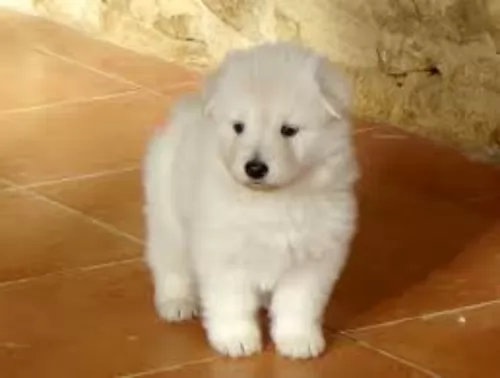 The medium-sized, well muscled Berger Blanc Suisse looks so much like the popular German Shepherd, and apart from its white coat, it has much the same physical standards. The females are about 55–61cm in height while the males are 60–66cm in height. The dogs dense, medium-length double coat tends to be slightly wavy but straight is more common. He has a long bushy tail.
The medium-sized, well muscled Berger Blanc Suisse looks so much like the popular German Shepherd, and apart from its white coat, it has much the same physical standards. The females are about 55–61cm in height while the males are 60–66cm in height. The dogs dense, medium-length double coat tends to be slightly wavy but straight is more common. He has a long bushy tail.
The Berger Blanc Suisse is somewhat longer than it is tall, but like the German Shepherd, it also has erect ears. In contrast to the white coat, the nose is black and the dog had dark, alert eyes.
This is an intelligent, confident dog and if you buy a puppy, of which the average litter size is 8, you will need to provide training and socialization to ensure he doesn't act totally independently and behave in a manner not pleasing to you. Once he is trained and socialized, he makes a wonderful pet and is social, playful and gentle. He is loyal and devoted to his human family, wanting to protect them. He is good around children and other pets in the home.
 The Newfoundland is a large dog standing at between 63cm to 74cm, both male and female. Weight can vary from 45kg to 80kg.
The Newfoundland is a large dog standing at between 63cm to 74cm, both male and female. Weight can vary from 45kg to 80kg.
He has a double coat of medium-length straight hair and the hair can be black, brown or gray. Although it is common for the Newfoundland to have a solid-colored coats, you will sometimes find small patches of white on their chest, toes, or at the tip of the tail. Then again you get the less common Newfoundlands where the coat is white with some black markings and these are known as Landseers.
The outer coat is coarse, oily and water-resistant quality, suited to a dog that loves to spend time in the water. The head is broad and large with small ears that he keeps lying close to his head. The tail is long and plumed and the feet are wide with webbing between the toes which aids him with swimming.
As with many large dogs, the Newfoundland is docile and his sheer size makes it that he is best suited to life in the countryside as opposed to living in the city. This is also because this particular dog wants to be close to water where he can swim.
He is a trustworthy, loyal dog and will get on well with children and pets in the home. Training and socialization is always recommended for any dog, but a big dog can often ‘get in the way’ indoors and you want him to lie down or sit when you tell him to. He is an intelligent dog so will respond well to training.
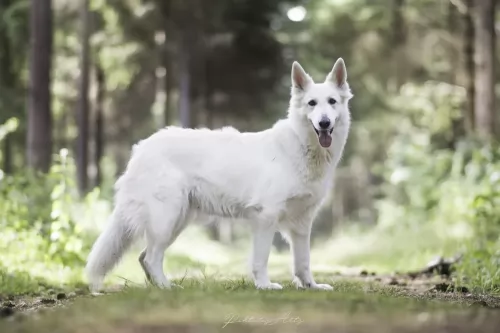 When you first set eyes on the Berger Blanc Suisse or White Shepherd, you can see that this is a strong, well-muscled, energetic dog, full of life and intelligent too. Add to that the fact that he is beautiful to look at.
When you first set eyes on the Berger Blanc Suisse or White Shepherd, you can see that this is a strong, well-muscled, energetic dog, full of life and intelligent too. Add to that the fact that he is beautiful to look at.
Your Berger Blanc Suisse dog is gentle and loyal with his own human family and will be somewhat wary of strangers. This dog is balanced, good-natured, friendly and affectionate and he just loves spending time with his family, being a good watch dog as well. He’s got so much going for him – good looks, a great personality, he is loyal, loving, strong, healthy and he’ll make one hang of a pet.
 Your beautiful, cuddly puppy will soon become a giant dog with a big appetite. Don’t just buy a cute puppy if you can’t afford to feed him properly and you can’t give him lots of attention.
Your beautiful, cuddly puppy will soon become a giant dog with a big appetite. Don’t just buy a cute puppy if you can’t afford to feed him properly and you can’t give him lots of attention.
Your dog will also be shedding, so be aware of these aspects before you bring a large Newfoundland into your home. He is a gentle dog, but his size could be worrisome if he isn’t trained, socialized and supervised.
Newfoundlands are amicable dogs, and while he may like to spend times indoors with you relaxing, he is a working dog and will require exercise and activities for mind and body.
Give this giant of a dog a loving home, and you will have a special, devoted friend like no other.
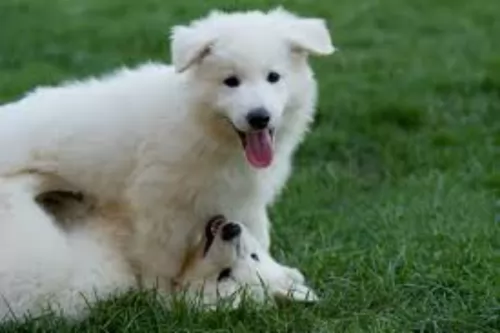 Your White Swiss Shepherd is a healthy, energetic, strong dog, but even so when you find him lethargic and listless, you want to get him to the vet for a check-up. It is always a good idea to be alert to common dog illnesses so that you know what to look out for in your dog.
Your White Swiss Shepherd is a healthy, energetic, strong dog, but even so when you find him lethargic and listless, you want to get him to the vet for a check-up. It is always a good idea to be alert to common dog illnesses so that you know what to look out for in your dog.
A common problem with dogs. The dog becomes restless and the abdomen is often enlarged. Get your dog to the doctor immediately.
This is a developmental defect of the hip and elbow joints and you’ll notice your pet battling to rise again after lying down.
This is a disease of the nervous system where the hind legs and feet drag. Sometimes the dog loses control over the bladder.
 The Newfoundland can be prone to serious health conditions such as hip dysplasia and gastric torsion. Deep chested dog breeds like the New Foundland are susceptible to bloat, a life threatening condition where the stomach swells, it can twist and the dog can die if help isn’t available. He will be salivating, restless and whining while also trying to vomit.
The Newfoundland can be prone to serious health conditions such as hip dysplasia and gastric torsion. Deep chested dog breeds like the New Foundland are susceptible to bloat, a life threatening condition where the stomach swells, it can twist and the dog can die if help isn’t available. He will be salivating, restless and whining while also trying to vomit.
Giant breeds are also prone to elbow and hip dysplasia, a genetic problem which can ultimately affect your dog’s mobility.
When in any doubt about your pet’s health, get him to the vet.
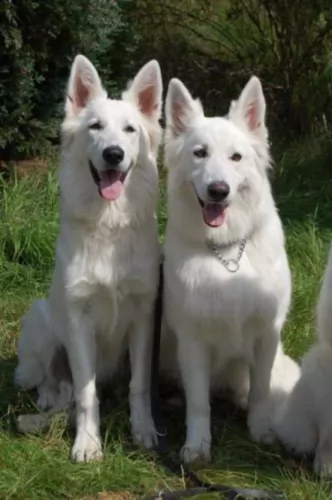 Apart from your Berger Blanc Suisse puppy need an excellent quality puppy food 4 times a day, as he gets older you will need to adjust his food to suit his high energy needs. Once your pet reaches a year of age you will know whether he requires one or two helpings of food a day. You can feed him a top quality commercial manufactured food or you can make your own home-made food for him which includes meat, rice and vegetables.
Apart from your Berger Blanc Suisse puppy need an excellent quality puppy food 4 times a day, as he gets older you will need to adjust his food to suit his high energy needs. Once your pet reaches a year of age you will know whether he requires one or two helpings of food a day. You can feed him a top quality commercial manufactured food or you can make your own home-made food for him which includes meat, rice and vegetables.
You want to make 100% sure he is getting the correct dosage of minerals and vitamins to ensure good health. To keep his eyes bright and his nose wet, include some raw meat into his diet as well. Make sure that he always has access to fresh, cool water.
Remember that your Berger Blanc Suisse is a working dog and he will need plenty of exercise. Apart from taking him on long walks, you can throw balls for him, buy rope toys for him and give him some rough and tumble. He is an intelligent breed and he will require some games that give him mental stimulation too.
Check regularly for fleas and ticks. You’ll pick this up with brushing his beautiful coat. Frequent brushing will help keep your dog clean and also remove all those loose hairs. Your White Swiss Shepherd Dog is a moderate, but constant shedder as well as being a heavy seasonal shedder so you will need to give him a good brush at least twice a week.
 Your dog’s coat will need to be brushed at least twice a week as he is a heavy shedder.
Your dog’s coat will need to be brushed at least twice a week as he is a heavy shedder.
Do the nails of your dog as soon as they start getting long. Long nails can hook on things and cause injury to the dog’s paw area.
This is a dog with floppy ears so check inside the ears to prevent ear infections, more so because this is a water-loving dog. The dampness inside the ears can cause bacteria.
This is a giant breed and sadly, they have the shortest lifespans. You want to make sure that you keep your giant breed as healthy as possible to ensure he reaches the 10 or so years allotted to him and to also prevent health problems.
Make sure your giant breed puppy and adult has the very highest quality commercially manufactured food to ensure he gets the right balance of nutrients in. This food also makes sure that your puppy rather grows at a slower rate and stronger as opposed to growing too quickly. Rapid growth comes with joint problems.
All dogs, large and small, don’t want exotic, strange food that upsets their stomachs. They want consistency and simplicity and they want tasty food. Give him some homemade food such as cooked chicken, brown rice or pasta and some vegetables such as sweet potato, carrots and spinach. You can add this occasionally to his dry kibble.
Add in some raw meat from time to time too. Your pet will be strong, healthy, happy and content.